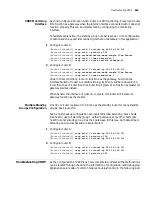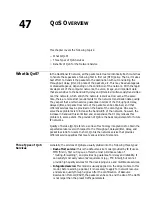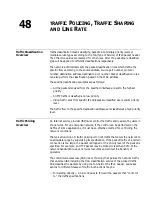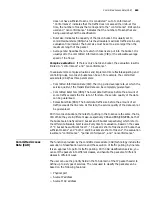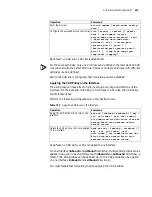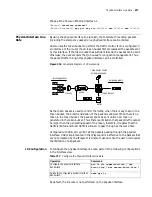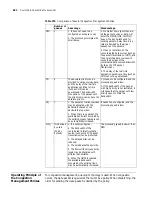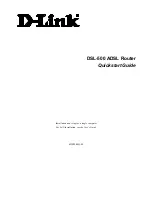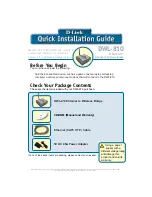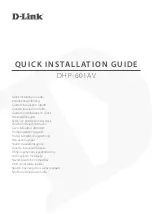
Committed Access Rate (CAR)
669
does not have sufficient tokens, it is considered “out of conformance”.
“Conformance” indicates that the traffic does not exceed the limit--at this
time, the number of tokens that correspond to the "conformance" limit can be
used and “nonconformance” indicates that the number of tokens that are
being used is beyond the specification.
■
Burst size: Indicates the capacity of the token bucket. It is usually set to
committed burst size (CBS) which is the allowable maximum traffic size in every
evaluation time interval. The burst size must be set to a size larger than the
maximum length of the packet.
■
Average rate: Specifies the rate at which tokens are put into the bucket. It is
usually set to the committed information rate (CIR) or the allowable average
speed of the flows.
Complex evaluation
If there is only one token bucket, the evaluation result is
limited to “conformance” and “nonconformance”.
To evaluate more complex situations and implement more flexible adjusting and
controlling rules, two token buckets can be set. For example, the committed
access rate (CAR) has three parameters:
■
Committed Information Rate (CIR): The long period average rate, at which the
service quality of the transmitted data can be completely guaranteed.
■
Committed Burst Size (CBS): The burst data traffic size before the amount of
some traffic exceeds the line rate. At this rate, the service quality of the data
can be guaranteed.
■
Excess Burst Size (EBS): The burst data traffic size before the amount of all
traffic exceeds the line rate. At this rate, the service quality of the data cannot
be guaranteed.
With two token buckets, the rates for putting in the tokens are the same, that is,
CIR. While they are in different size--respectively CBS and EBS (CBS<EBS, both of
the buckets are briefly called C bucket and E bucket respectively), which refer to
the different allowable burst levels. Every time for evaluation, based on the cases
of “C bucket has sufficient token”, “C bucket is short of tokens and E bucket has
sufficient tokens” and “both C and E buckets are short of tokens”, the evaluation
results are “conformance”, “partial conformance”, and “nonconformance”.
Committed Access
Rate (CAR)
The functions provided by the committed access rate (CAR) technology include the
execution of classification service and the execution of traffic policing by line rate.
It is an approach to perform traffic policing. With CAR classification service, you
can sort the packets into different classes, and handle the packets of different
classes in different ways.
The user can use the priority fields in the ToS domain of the IP packet header to
define up to six types of services. The rules used to classify the packets can be
based on the following features:
■
Physical port
■
Source IP address
■
Source MAC address
Summary of Contents for 3036
Page 1: ...http www 3com com 3Com Router Configuration Guide Published March 2004 Part No 10014299 ...
Page 4: ...VPN 615 RELIABILITY 665 QOS 681 DIAL UP 721 ...
Page 6: ...2 ABOUT THIS GUIDE ...
Page 7: ...I GETTING STARTED Chapter 1 3Com Router Introduction Chapter 2 3Com Router User Interface ...
Page 8: ...4 ...
Page 16: ...12 CHAPTER 1 3COM ROUTER INTRODUCTION ...
Page 34: ...30 ...
Page 60: ...56 CHAPTER 3 SYSTEM MANAGEMENT ...
Page 98: ...94 CHAPTER 6 DISPLAY AND DEBUGGING TOOLS ...
Page 110: ...106 ...
Page 114: ...110 CHAPTER 8 INTERFACE CONFIGURATION OVERVIEW ...
Page 158: ...154 CHAPTER 10 CONFIGURING WAN INTERFACE ...
Page 168: ...164 ...
Page 188: ...184 CHAPTER 13 CONFIGURING PPPOE CLIENT ...
Page 192: ...188 CHAPTER 14 CONFIGURING SLIP Router ip route static 0 0 0 0 0 0 0 0 10 110 0 1 ...
Page 248: ...244 CHAPTER 16 CONFIGURING LAPB AND X 25 ...
Page 320: ...316 ...
Page 330: ...326 CHAPTER 20 CONFIGURING IP ADDRESS ...
Page 362: ...358 CHAPTER 21 CONFIGURING IP APPLICATION ...
Page 374: ...370 CHAPTER 23 CONFIGURING IP COUNT ...
Page 406: ...402 CHAPTER 25 CONFIGURING DLSW ...
Page 408: ...404 ...
Page 452: ...448 CHAPTER 29 CONFIGURING OSPF ...
Page 482: ...478 CHAPTER 30 CONFIGURING BGP ...
Page 494: ...490 CHAPTER 31 CONFIGURING IP ROUTING POLICY ...
Page 502: ...498 ...
Page 508: ...504 CHAPTER 33 IP MULTICAST ...
Page 514: ...510 CHAPTER 34 CONFIGURING IGMP ...
Page 526: ...522 CHAPTER 36 CONFIGURING PIM SM ...
Page 528: ...524 ...
Page 532: ...528 CHAPTER 37 CONFIGURING TERMINAL ACCESS SECURITY ...
Page 550: ...546 CHAPTER 38 CONFIGURING AAA AND RADIUS PROTOCOL ...
Page 590: ...586 CHAPTER 40 CONFIGURING IPSEC ...
Page 599: ...IX VPN Chapter 42 Configuring VPN Chapter 43 Configuring L2TP Chapter 44 Configuring GRE ...
Page 600: ...596 ...
Page 638: ...634 CHAPTER 43 CONFIGURING L2TP ...
Page 649: ...X RELIABILITY Chapter 45 Configuring a Standby Center Chapter 46 Configuring VRRP ...
Page 650: ...646 ...
Page 666: ...662 ...
Page 670: ...666 CHAPTER 47 QOS OVERVIEW ...
Page 700: ...696 CHAPTER 49 CONGESTION MANAGEMENT ...
Page 706: ...702 CHAPTER 50 CONGESTION AVOIDANCE ...
Page 707: ...XII DIAL UP Chapter 51 Configuring DCC Chapter 52 Configuring Modem ...
Page 708: ...704 ...
Page 762: ...758 CHAPTER 52 CONFIGURING MODEM ...





